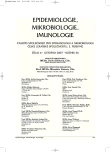-
Medical journals
- Career
Hrabák J.: Clinically Important Beta-Lactamases of Gram-Negative Bacteria: AmpC
Authors: J. Hrabák
Authors‘ workplace: Ústav mikrobiologie LF UK a FN v Plzni
Published in: Epidemiol. Mikrobiol. Imunol. 56, 2007, č. 4, s. 155-165
Overview
Beta-lactamases are the most common cause of beta-lactam resistance in Gram-negative bacteria. With third-generation and fourth-generation cephalosporins being introduced into practice, new beta-lactamases have evolved, able to hydrolyze these antibiotics. AmpC-type beta lactamases (cephalosporinases) are serine enzymes with the ability to hydrolyze penicillins, monobactams and cephalosporins of all generations, including cephamycins. Over the last two decades, transferable plasmid-mediated class C beta-lactamases have been reported with increasing frequency. The genes for resistance to other groups of antibiotics are usually carried on the same mobile element as the AmpC genes. A reliable method for AmpC detection in routine diagnosis has not been available yet. The issue of AmpC-type beta lactamases is summarized, including their identification, interpretation of susceptibility test results and recommended treatment of infection caused by AmpC producers.
Key words:
resistence – cephalosporins – beta-lactamases – enterobacteria – AmpC.
Labels
Hygiene and epidemiology Medical virology Clinical microbiology
Article was published inEpidemiology, Microbiology, Immunology

2007 Issue 4-
All articles in this issue
- Hrabák J.: Clinically Important Beta-Lactamases of Gram-Negative Bacteria: AmpC
- Simultaneous Detection of Chlamydia pneumoniae and Chlamydia trachomatis DNA by Real-time PCR
- Babesiosis, a Little Known Zoonosis
- Epidemiology of the Metabolic Syndrome and Possibility for its Prevention by Physical Activities
- Biofilm Formation and Response to Oxidative Stress in Pseudomonas aeruginosa and Vibrio cholerae non-01 Depending on Culture Media
- Epidemiology, Microbiology, Immunology
- Journal archive
- Current issue
- Online only
- About the journal
Most read in this issue- Hrabák J.: Clinically Important Beta-Lactamases of Gram-Negative Bacteria: AmpC
- Babesiosis, a Little Known Zoonosis
- Simultaneous Detection of Chlamydia pneumoniae and Chlamydia trachomatis DNA by Real-time PCR
- Epidemiology of the Metabolic Syndrome and Possibility for its Prevention by Physical Activities
Login#ADS_BOTTOM_SCRIPTS#Forgotten passwordEnter the email address that you registered with. We will send you instructions on how to set a new password.
- Career

